
Water Carrier
![]()
1. [ For I am Water Now ]
Water Carrier - Museum Nogueira da Silva - Minho University Braga Portugal 2014.
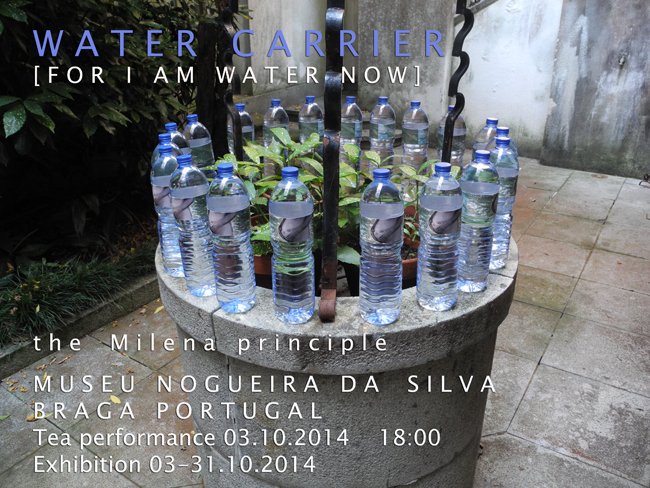
An art project in various European cities with the underlying thought that we are water. Central activity in Braga Portugal is an art performance based on a tea ritual. Parallel event is an exhibition depicting a flow of drawings, prints and videos and an installation in the Museum Nogueira da Silva in Braga 2014.
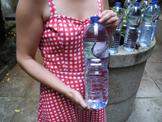
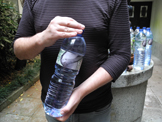
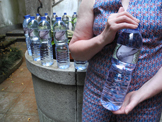
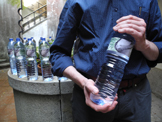
A tea ritual as an utopic field of democracy
We redefine the tea ritual on an artistic way as a philosophical and artistical meeting place, a resonating field of visual poetry and togetherness in a “politics of the heart', incorporating the utopic desire to a harmonious living together, an unconditional engagement in a field without distances, nor hierarchy. It is the echo of a humane democracy that is lost in our world.
The tea ceremony is multidisciplinary. Conversations, sound, soundscapes, smell, gestures are integrated. Parallel events are a series of performances and talks based on the topic and an exhibition with a flux of drawings, prints and the video-performances “We wish we were like water” (Braga, Museu Biscainhos 2010), Writing in water (Venice Biennale 2007) and Liquid islands (Venice Biennale 2011) next to the video-poems “Antarctica” (Brasilia, 1a Feira Intercional do Livro / Museu Nacional).
[Water Carrier - for I am water now] video at Museu Nogueira da Silva Braga Portugal 2014.
![]()
.
2. [ For I am Water Now (II) ]
Invisible Cities Festival - ltalian Cultural Institute Athens Greece 2015.
Water carrier - performance / urban tea ritual
the Milena principle / Invisible Cities Festival
Athens, Friday 23d-Saturday 24th of October 2015.
A performance based on a tea ritual. Conversations, soundscapes, smell, gestures are part of an alternating talk and performance focusing on the relation between water, writing and the city during an ad hoc temporary exhibition as a flow of drawings, prints, sounds and videos. We redefine the tea ritual as a literary and artistical meeting place inspired by Venice and the (wordless) conversations between Marco Polo and Kublai Khan in the novel Invisible Cities of Calvino.
Geert Vermeire and Stefaan van Biesen
Invisible Cities / Αόρατες Πόλεις at Istituto Italiano di Cultura di Atene.
Coordinators: Maria Saridaki and Maria Vasileiou.
On the occasion of 30 years since the death of Italian writer Italo Calvino (1923-1985), the department of Communication and Media of the University of Athens and the Italian Cultural Institute of Athens organize an interdisciplinary artistic and academic event called "Invisible Cities".
"The Invisible Cities", the most famous novel of the Italian writer, was first published in 1972 and takes us to fictive towns, where wishes, exchanges, memory, signs and things emerge as building stones of an urban society, reflecting about the contemporary urban culture. The event brings together scientists, academics and artists in a personal and material dialogue about imagination and contemporary urban society.
![]()
3. [ Fading Into Silence ]
Water Carrier III - College Of Arts University Edinburgh Scotland 2016.
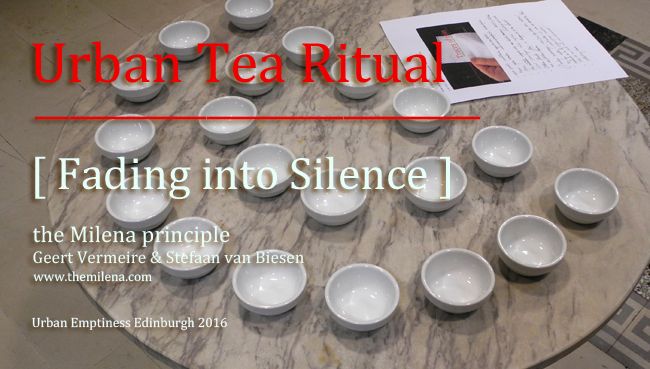
'Fading in to Silence | Urban Tea Ritual' with the performance 'Unisono' as a silent prologue by Geert Vermeire and Stefaan Van Biesen, artists / the Milena Principle, is one the common actions, which will take place on Wednesday 17th February 2016, at G.06, 50 George Square.
Silence is a connection, a condition that compels or invites to listen. The “Unisono” performance starts as a wordless conversation of which both the performers are a part of a bonding silence. This creates a possibility for an instant conversation out of an awakening whispering, but a conversation is not necessary. It is a ritual silence. Both protagonists represent “silence” through their muteness, their physical presence. If a conversation starts then it is as well a registration of their “inner landscape”, a field of silence.
The tea ritual wants to connect people through silence in a speechless being together and sharing. The host is a medium of silence who hands on a wordless way “connection”, “care”, “attention for each other”,”hospitality for strangers”, “equality”, “social aesthetics”, “utopian ideas of democracy”, “the sensoriality of tasting and degustation”, relating through water and tea with nature (as a rediscovery of nature and becoming part of it), the ceremony as an ecological and symbolical ritual.
![]()
About Water Carrier
An art project in various European cities with the underlying thought that we are water. Central activity in Braga Portugal is an art performance based on a tea ritual. Parallel event is an exhibition depicting a flow of drawings, prints and videos and an installation in the Museum Nogueira da Silva in Braga 2014.
A tea ritual as an utopic field of democracy
We redefine the tea ritual on an artistic way as a philosophical and artistical meeting place, a resonating field of visual poetry and togetherness in a “politics of the heart', incorporating the utopic desire to a harmonious living together, an unconditional engagement in a field without distances, nor hierarchy. It is the echo of a humane democracy that is lost in our world.
The tea ceremony is multidisciplinary. Conversations, sound, soundscapes, smell, gestures are integrated. Parallel events are a series of performances and talks based on the topic and an exhibition with a flux of drawings, prints and the video-performances “We wish we were like water” (Braga, Museu Biscainhos 2010), Writing in water (Venice Biennale 2007) and Liquid islands (Venice Biennale 2011) next to the video-poems “Antarctica” (Brasilia, 1a Feira Intercional do Livro / Museu Nacional) connected.
When tea is more than a drink and the tea ceremony is understood and practiced to foster harmony in humanity, promote harmony with nature, discipline the mind, quiet the heart, and attain the purity of enlightenment, the art of tea becomes teaism. The term "chadao" has two words, the first being 'tea' and the second the Chinese loanword tao/dao/ native suffix -ism (also Japanese: 主義), and could thus be read as 'teaism'. Another, more literal reading of the word is the 'way of tea' (茶 tea and 道 way), comparable with for example 弓道; the way of the bow. The term can be used to describe tea ceremony as the interests in tea culture and studies and pursued over time with self-cultivation. Teaism is mostly a simplistic mode of aesthetics, but there are subtle insights into ethics, and even metaphysics. Teaism is related to teamind. A sense of focus and concentration while under the influence of great tasting tea.
Tea rituals as a philosophical meeting place, a resonating field of poetry and togetherness. Again: 'the politics of the Heart'...
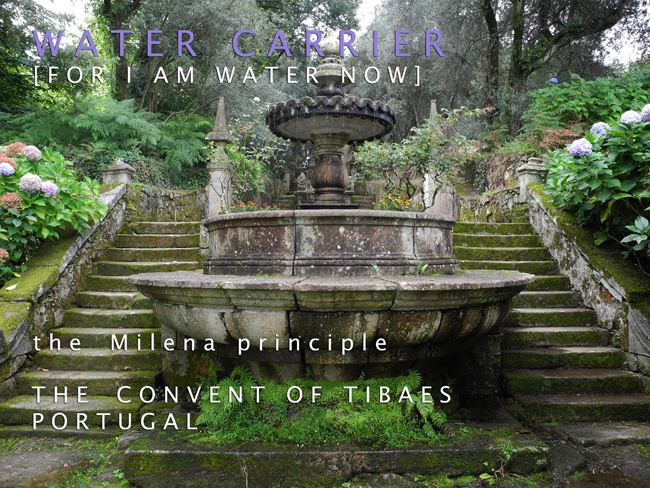
![]()
© private foundation van biesen-mestdagh 03.07.2021